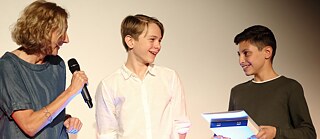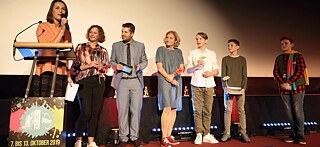2019 Children’s and Youth Film Award of the Goethe-Institut
Very Close Together

The German production "Too Far Away" by Sarah Winkenstette received this year’s Children’s and Youth Film Award at the 24th International Film Festival for Children and Young Audiences in Chemnitz. The Goethe-Institut has conferred the award during the Schlingel Festival for several years now.
By Holger Twele
Dissimilar friends
Everything that has ever mattered to almost twelve-year-old Ben is lost at a single stroke and cannot be restored or undone. His home village in the state of North Rhine-Westphalia – including the small football field that he inseparably links to his athletic success – is forced to make way to lignite mining. His friends, who are scattered in all directions after the relocation, are suddenly “too far away.” The new beginning in a strange environment is difficult for Ben. He even has to fight to regain a place on the team for his beloved football, especially since his new classmate Tariq, who fled war-torn Aleppo with his missing brother, is apparently better at the sport than Ben. Despite their shared enthusiasm for football, it takes a while for the two dissimilar boys to befriend each other and to entrust one another with their feelings. Once they do and become “blood brothers,” the two discover that besides the sport, they have far more in common than they suspected.

Empathetic und multi-layered
In its statement, the jury praised the “empathetic performance” of the two lead actors Yoran Leicher and Sohbi Awad, who only arrived in Germany eight months before the film began shooting, the “multi-layered dialogues” and “the sensitive approach to a complex situation between uprootedness and the search for a home.” Director and screenwriter Susanne Finken succeeded in relating a story about the loss of home and the difficulties of finding one’s way in a strange land in an exciting and entertaining way to a young audience aged ten and up without placing the refugee drama in the focus. The two boys’ similar experiences of loss and their needs, but sport in particular as an aid in promoting integration, become bridges for understanding and mutual empathy. And the story is not told in a superficial or expository manner, but from the point of view of the two protagonists.
Loss and new beginning
The symbolic, expressive images of the film play a key role in enabling young and old to empathise with their situation. Gigantic shovel excavators slice through the landscape all the way to the horizon and documentary-like scenes show a house in the abandoned village being demolished in view of the two children. By comparing and revealing parallels between this ruthless exploitation of nature and the loss of homes in bomb-ravaged Aleppo in Syria, the film also addresses the differences between the two places. But because the specific backgrounds and causes of this man-made destruction are left unmentioned, the film tells a universal story about friendship and a new beginning that can be understood all over the world.